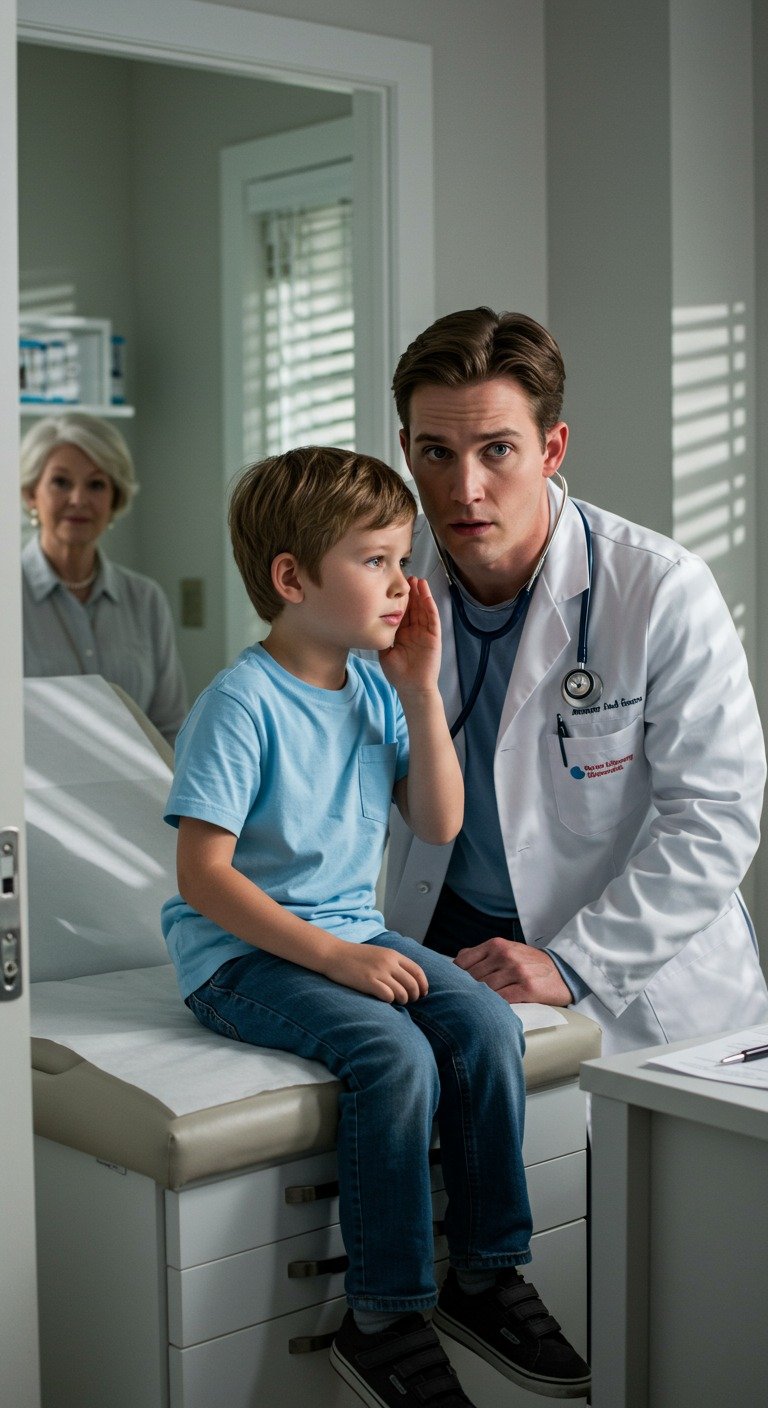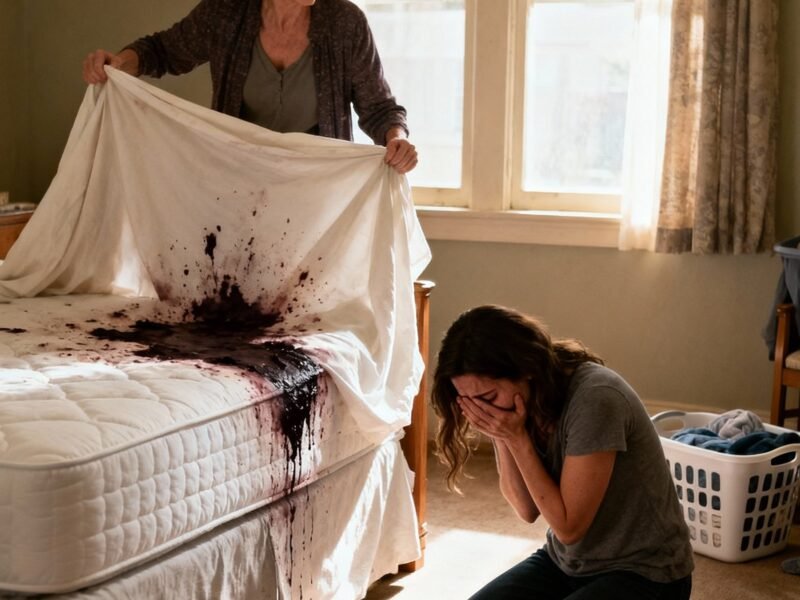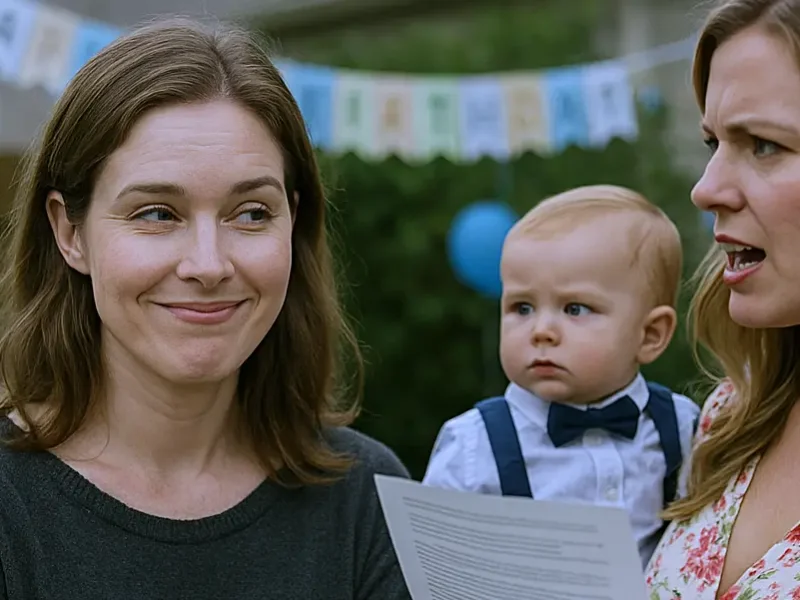My mother-in-law told the doctor that I was paranoid and exaggerating my son’s illness. But when the doctor examined him alone, my son whispered a secret about grandma’s soup. The doctor’s face went pale, and he ordered a hidden test. When the results came in, he called me and said, “Come to the hospital. Alone.”
The sterile, white walls of the clinic felt like they were closing in on Sarah. For three months, this had been her world: a blur of waiting rooms, sympathetic but unhelpful nurses, and the cloying scent of hand sanitizer.

Her son, six-year-old Leo, sat listlessly on her lap, his normally rosy cheeks pale, his vibrant energy replaced by a profound, unshakeable fatigue. He was a ghost of the little boy he used to be, plagued by chronic nausea, stomach pains, and a weariness that no amount of sleep could cure.
Beside her sat her mother-in-law, Helen, the picture of grandmotherly concern. Dressed impeccably, her silver hair perfectly coiffed, she projected an aura of serene competence that made Sarah’s own frantic worry seem messy and excessive.
When Dr. Peterson, a kind but overworked man nearing retirement, entered the room, Helen took control. She answered his questions with smooth efficiency, her hand resting reassuringly on Sarah’s shoulder in a gesture that felt less like support and more like a restraint.
“He had another bad night, Doctor,” Sarah began, her voice tight with anxiety. “He was up three times, complaining of stomach cramps, and he barely touched his breakfast.”
Before the doctor could respond, Helen interjected with a soft, dismissive laugh. “Oh, Sarah, you worry so. He ate a perfectly good bowl of my homemade oatmeal an hour later. You know how children are.” She turned to the doctor, her expression one of shared, weary wisdom. “She means well, Doctor, she just gets… ideas. She reads these terrible things on the internet all day and convinces herself Leo has some rare, exotic disease. Honestly, I think her anxiety is the bigger issue here.”
Dr. Peterson offered Sarah a patronizing smile. “Now, now, Mrs. Miller, let’s not get carried away by what Dr. Google says. We’ve run all the standard tests. They’re all clear. He’s likely just a sensitive boy with a finicky stomach.”
Sarah felt a familiar wave of helpless frustration. She was being gaslit, her valid, maternal concerns repackaged as neurotic paranoia. She wasn’t just fighting for her son’s health; she was fighting an insidious psychological war against a woman who was supposed to be her ally. She looked at Leo, his head now resting weakly against her chest, and knew, with a certainty that chilled her to the bone, that this was not just a finicky stomach.
Two weeks later, they were back. Dr. Peterson was at a conference, and in his place was Dr. Evans, a young resident whose face still held a refreshing lack of cynicism. He was attentive, his questions precise, and most importantly, he listened. He listened to Helen’s polished narrative of the overanxious mother, but his eyes kept drifting to Sarah’s exhausted face and to the pale, quiet boy in her lap. He saw the disconnect.
“Okay,” he said, after reviewing the thick file of inconclusive tests. “I’d like to examine Leo alone for a few minutes, if that’s alright. Sometimes kids open up more without an audience.”
Helen’s smile tightened for a fraction of a second before she smoothly agreed. “Of course, Doctor. Whatever you think is best.”
Once the door was closed, Dr. Evans lifted Leo onto the examination table. He made a game of it, letting Leo listen to his own heart with the stethoscope. “Okay, Mr. Lion, let me hear you roar,” he said, his voice warm and playful. Leo, who hadn’t genuinely smiled in weeks, let out a small giggle.
As Dr. Evans gently palpated his abdomen, he asked a simple, open-ended question. “Anything taste funny lately, buddy? Anything yucky?”
Leo’s playful demeanor vanished. He looked around the room, as if to check for spies, and then leaned in close to the doctor’s ear. His voice was a tiny, conspiratorial whisper.
“Grandma’s soup,” he breathed. “She puts… the sleepy leaves from the garden in it. She says it’s her secret spice.”
Sleepy leaves. The childish phrase sent a jolt through Dr. Evans. He kept his expression neutral, but his mind was racing. He remembered Helen, in the hallway, boasting about her “award-winning English garden.” He pictured Leo’s chart: chronic fatigue, nausea, abdominal pain.
The symptoms, so maddeningly vague on their own, suddenly clicked into a terrifyingly specific pattern. They were classic signs of low-dose, cumulative poisoning from common but toxic ornamental plants.
Plants like Foxglove or Oleander, both known for their beautiful flowers and their potent cardiac glycosides. “Sleepy leaves” could be a child’s description for something that made him feel lethargic, that made his heart… slow. The whisper was not a fantasy. It was a clue.
Dr. Evans finished the exam and walked back into the waiting area, his mind a whirlwind. Accusing a respected, “pillar of the community” grandmother of slowly poisoning her own grandson based on the whisper of a six-year-old was professional suicide. He needed proof. He needed science.
He put on his most thoughtful, professional face. “You know,” he began, addressing both women, “given the persistence of these symptoms, I’d like to run a more comprehensive blood panel. We should rule out some of the more obscure environmental allergens or perhaps an atypical enzymatic deficiency. It’s a long shot, but we need to be thorough.”
Helen beamed, seeing this as a validation of her narrative that something was wrong with Leo, just not what Sarah thought. “Of course, Doctor! Whatever it takes. We are so grateful for your diligence.” Sarah just nodded, another round of tests feeling like another dead end.
In the lab request system, Dr. Evans checked the boxes for the comprehensive allergy panel. Then, he scrolled down and added another, far more specific test: a full toxicology screen, with a note to the lab to prioritize analysis for cardiac glycosides, specifically digitoxin and oleandrin.
The rest of the day was an agony of waiting. Sarah went home, feeling more defeated than ever. Helen was triumphant, believing she had successfully managed the young doctor.
Late that afternoon, an email notification popped up on Dr. Evans’s computer. The lab results were in. He opened the encrypted PDF, his hand hovering over the mouse. He scrolled past the normal ranges for liver enzymes and blood counts until he reached the final section. His breath caught.
The report was stark and unequivocal. Leo’s blood contained low but significant traces of digitoxin, the active compound in the Foxglove plant (Digitalis purpurea). The levels were not acutely lethal, but they were perfectly consistent with chronic, repeated exposure. It was a slow, methodical poisoning.
The child’s whisper was no longer a clue. It was a testimony. And Dr. Evans was now its sole, horrified witness.
Dr. Evans’s first call was not to Child Protective Services. It was to Sarah. His voice was calm but firm, leaving no room for argument.
“Sarah, this is Dr. Evans. I have the results of Leo’s tests. I need you to come back to the hospital right now. And it is very, very important that you come alone.”
An hour later, Sarah sat in his small, cluttered office, her hands clenched in her lap. Dr. Evans closed the door and sat opposite her. He didn’t soften the blow; he delivered the truth with gentle, clinical precision, laying out the test results and explaining what they meant.
As she listened, Sarah’s face went through a storm of emotions: disbelief, horror, and then, a profound and shattering wave of vindication. Tears streamed down her face, but they were not tears of sadness. They were tears of relief.
“So I’m not crazy,” she whispered, the words a release of months of pent-up anguish. “I’m not paranoid. I knew something was wrong.”
In that moment, the timid, gaslit woman vanished, replaced by a mother whose instincts had been proven terrifyingly correct. A cold, hard anger settled in her eyes. “What do we do?”
With Sarah’s full consent, Dr. Evans initiated the hospital’s protocol. He contacted the hospital administrator and a representative from Child Protective Services. A plan was formed.
The next morning, Helen received a call from Dr. Evans’s office. “Mrs. Miller, we have the results and would like to discuss a new, more aggressive treatment plan for Leo. Could you and Sarah come in at eleven?”
Helen arrived, radiating confidence, ready to take charge of the “new plan.” But when she was led into a conference room, she found not just the young doctor, but Sarah, whose eyes were no longer fearful but filled with an icy fury, and a stern-faced woman who introduced herself as being from CPS.
Helen’s confident smile faltered.
Dr. Evans didn’t waste any time. He calmly slid a copy of the toxicology report across the table. “Mrs. Miller,” he began, his voice devoid of all warmth. “Before we discuss any new treatments, perhaps you could tell us about the ‘secret spice’ from your garden that you’ve been adding to your grandson’s soup.”
The mask of the doting grandmother shattered. Helen’s face, a moment ago composed and superior, crumpled into a mask of pure panic. She sputtered denials, her lies flimsy and desperate against the stark, scientific truth on the paper in front of her. But it was useless. The social worker’s questions were relentless, Dr. Evans’s medical facts were irrefutable, and Sarah’s cold, silent stare was the most damning judgment of all.
Helen was arrested later that day. The story became a local scandal. Her “award-winning” English garden, once a symbol of her pride and status, was cordoned off with police tape, its beautiful, deadly flowers now evidence in a criminal investigation.
Freed from the daily ingestion of poison, Leo’s recovery was nothing short of miraculous. Within two weeks, the color returned to his cheeks. The nausea and pain vanished. The lethargic ghost was replaced by a vibrant, laughing little boy, chasing squirrels and kicking a soccer ball with boundless energy.
Months later, on a bright autumn afternoon, Sarah sat on a park bench, watching Leo race his friends up the slide. He was healthy. He was happy. He was safe.
“He looks like a different kid,” a familiar voice said.
She looked up to see Dr. Evans, out of his white coat, smiling down at her. He had come to check on his favorite patient, a visit that had become a welcome, friendly habit.
“He is a different kid,” Sarah agreed, her heart swelling with a fierce, protective love. “He’s the kid he was always supposed to be.”Gift baskets
She watched her son, a whirlwind of pure joy, and thought about the nightmare they had survived. For months, the world, led by Helen, had tried to convince her that a mother’s fear was a form of sickness.
They praised the hand that was poisoning her child and questioned the heart that was screaming in protest. But in the end, the truth hadn’t come from a test or a scan. It came from a child’s whisper and a doctor’s trust.
“I learned something,” she said quietly, more to herself than to him. “A mother’s intuition isn’t paranoia. It’s the loudest sound in a silent room.


